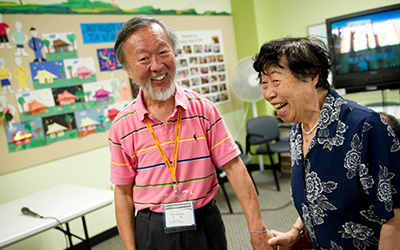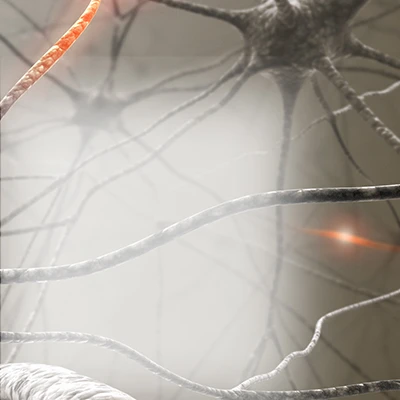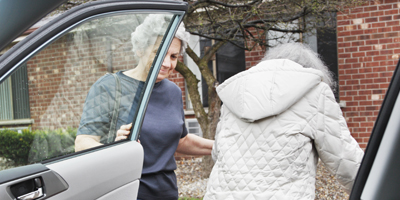Adult Day Centers
Adult day centers offer people with Alzheimer's and other dementias the opportunity to be social and to participate in activities in a safe environment.
Benefits of day centers
 If you are a full-time caregiver, adult day centers can offer benefits to both you and people with dementia, while providing a much-needed break. While the person with Alzheimer's is at the center, you'll have time to rest, run errands or finish other tasks. If you find yourself feeling guilty, ask yourself this, "If I wear myself out to the point of total exhaustion, what good will I be to the person with dementia?"
If you are a full-time caregiver, adult day centers can offer benefits to both you and people with dementia, while providing a much-needed break. While the person with Alzheimer's is at the center, you'll have time to rest, run errands or finish other tasks. If you find yourself feeling guilty, ask yourself this, "If I wear myself out to the point of total exhaustion, what good will I be to the person with dementia?"If you are a caregiver that works during the day, an adult day center can be very helpful as you try to balance a job with caregiving duties. Hours of service vary at each center, but some are open from seven to 10 hours per day. Some also may offer weekend and evening hours, and transportation and meals are often provided.
For people with Alzheimer's and dementia, adult day centers provide a chance to be social and to participate in staffed activities such as music and exercise programs. Keep in mind that the person with dementia will need time to adjust to the experience of going to the center. Some people may resist going at first, but they often look forward to the visit after several weeks of attending, meeting people and joining in activities.
Services
- Counseling: The center may provide support services for people with dementia and their families. For example, they may offer guidance on outside resources and arrange for supportive care in the home.
- Health services: If the person with Alzheimer's requires medical services (i.e., insulin shots, help with medication, etc.) be sure to ask if staff provides medical assistance. Some centers also may provide blood pressure checks and physical, dental, foot, eye or ear examinations.
- Nutrition: Does the center provide nutritious meals and snacks? Sample a meal to find out. If needed, ask if the center can accommodate a special diet or provide a culturally specific menu. Some centers also offer nutritional education programs.
- Personal care: Centers may provide help with hairstyling, toileting, eating, showering and other personal care tasks.
- Activities: Daily activities may include music, art, recreation, discussion and support groups. Ask what activities are offered for people with dementia.
- Behavior management: Find out if the center is prepared to deal with behaviors associated with dementia. These many include wandering, incontinence, hallucinations, sexually inappropriate behavior or speech difficulties.
- Therapy: Some centers help arrange for needed physical, occupational or speech therapy. They may have therapists onsite or on-call.
- Special needs: Make sure the center can accommodate any special needs. For example, is the center equipped to deal with someone who uses a wheelchair, who is hearing or visually impaired, or who is handicapped in another way? Knowing about any service restrictions before using a center may help prevent problems.
Selecting a center
- Learn about your options. Talk to your local Alzheimer's Association chapter about adult day centers in your area, ask other caregivers about their experiences, and call your local senior center or area agency on aging. You can also use our Community Resource Finder to find an adult day program near you.
- Consider your needs. Adult day centers can vary. Consider which center offers the services that you and the person with dementia need.
- Give the day center a chance. Consider using its services at least twice a week for a month before making a final decision. Occasional use won't give you an accurate picture of how the center operates.
- Re-evaluate care needs. At some point the person with Alzheimer's may need more care than the center can provide. Center staff and support groups can help evaluate your needs for future care.
Questions to ask
When choosing an adult day center, arrange a meeting with the staff and ask these questions:
- What are the hours, fees and services? (Be sure to ask about the minimum attendance requirements and the notification policy for absences.)
- What types of programs are offered?
- Are people with dementia separated from other participants or included in general activities?
- Will the center evaluate the person's needs? How will this evaluation be accomplished? How often will it be repeated?
- Is staff trained in dementia issues?
- What types of health care professionals are on staff? How do you screen them?
- How are emergency situations handled?
- How do you ensure the safety of the participants?
- Is transportation available?
Cost
Many centers offer services on sliding scales, where caregivers pay according to ability or income. In some states, Medicaid covers cost for people with very low income and few assets. Be sure to ask about basic fees, financial assistance and additional charges for such services as crafts or field trips.
Related Pages

The Alzheimer’s Association is in your community.
Find Your Local Chapter
Connect with our free, online caregiver community.
Join ALZConnected




